On the First Sunday of the Great Fast our Church celebrates the triumph of Orthodoxy, the victory of true Christian teaching over all perversions and distortions thereof—heresies and false teachings. On the second Sunday of the Great Fast it is as though this triumph of Orthodoxy is repeated and deepened in connection with the celebration of the memory of one of the greatest pillars of Orthodoxy, the hierarch Gregory Palamas, Archbishop of Thessalonica, who by his grace-bearing eloquence and the example of his highly ascetic private life put to shame the teachers of falsehood who dared reject the very essence of Orthodoxy, the podvig of prayer and fasting, which enlightens the human mind with the light of grace and makes it a communicant of the divine glory.

Alas! How few people there are in our times, even among the educated, and at times even among contemporary “theologians” and those in the ranks of the clergy, who understand correctly what Orthodoxy is and wherein its essence lies. They approach this question in an utterly external, formal manner and resolve it too primitively, even naively, overlooking its depths completely and not at all seeing the fullness of its spiritual contents.
The superficial opinion of the majority notwithstanding, Orthodoxy is not merely another of the many “Christian confessions” now in existence, or as it is expressed here in America “denominations.” Orthodoxy is the true, undistorted, unperverted by any human sophistry or invention, genuine teaching of Christ in all its purity and fullness—the teaching of faith and piety which is life according to the Faith.
Orthodoxy is not only the sum total of dogmas accepted as true in a purely formal manner. It is not only theory, but practice; it is not only right Faith, but a life which agrees in everything with this Faith. The true Orthodox Christian is not only he who thinks in an Orthodox manner, but who feels according to Orthodoxy and lives Orthodoxy, who strives to embody the true Orthodox teaching of Christ in his life.
“The words that I speak unto you are spirit and life”—thus the Lord Jesus Christ spoke to His disciples of His divine teaching [John 6 63][1]. Consequently, the teaching of Christ is not only abstract theory merely, cut off from life, but spirit and life. Therefore, only he who thinks Orthodoxy, feels Orthodoxy and lives Orthodoxy can be considered Orthodox in actuality.
At the same time one must realize and remember that Orthodoxy is not only and always that which is officially called “Orthodox,” for in our false and evil times the appearance everywhere of pseudo-Orthodoxy which raises its head and is established in the world is an extremely grievous but, regrettably, an already unquestionable fact. This false Orthodoxy strives fiercely to substitute itself for true Orthodoxy, as in his time Antichrist will strive to supplant and. replace Christ with himself.
Orthodoxy is not merely some type of purely earthly organization which is headed by patriarchs, bishops and priests who hold the ministry in the Church which officially is called “Orthodox.” Orthodoxy is the mystical “Body of Christ,” the Head of which is Christ Himself (see Eph. 1 22–23[2] and Col. 1 18, 24[3] et seq.), and its composition includes not only priests but all who truly believe in Christ, who have entered in a lawful way through Holy Baptism into the Church He founded, those living upon the earth and those who have died in the Faith and in piety.
The Orthodox Church is not any kind of “monopoly” or “business” of the clergy as think the ignorant and those alien to the spirit of the Church. It is not the patrimony of this or that hierarch or priest. It is the close-knit spiritual union of all who truly believe in Christ, who strive in a holy manner to keep the commandments of Christ, with the sole aim of inheriting that eternal blessedness which Christ the Savior has prepared for us, and if they sin out of weakness, they sincerely repent and strive “to bring forth fruits worthy of repentance” [Luke 3 8][4].
The Church, it is true, may not be removed completely from the world, for people enter her who are still living on the earth, and therefore the “earthly” element in her composition and external organization is unavoidable, yet the less of this “earthly” element there is, the better it will be for her eternal goals. In any case this “earthly” element should not obscure or suppress the purely spiritual element—the matter of salvation of the soul unto eternal life—for the sake of which the Church was both founded and exists.
The first and fundamental criterion, which we may use as a guide to distinguish the True Church of Christ from the false Churches (of which there are now so many!), is the fact that it has preserved the Truth intact, undistorted by human sophistries, for according to the Word of God, “the Church is the pillar and ground of truth” [1 Tim. 3 15][5], and therefore in her there can be no falsehood. Any which in its name officially proclaims or confirms any falsehood is already not the Church. Not only the higher servants of the Church, but the ranks of believing laymen must shun every falsehood, remembering the admonition of the Apostle: “Wherefore, putting away lying,-speak every man truth with his neighbor” [Eph. 4 25][6], or “Lie not to one another” [Col. 3 9][7]. Christians must always remember that according to the words of Christ the Savior, lying is from the devil, who “is a liar, and the father of lies” [John 8 44][8]. And so, where there is falsehood there is not the True Orthodox Church of Christ! There is instead a false church which the holy visionary vividly and clearly depicted in his Apocalypse as “a great whore that sitteth upon many waters, with whom the kings of the earth have committed fornication” [Rev. 17 1–2][9].
Even in the Old Testament from the prophets of God we see that unfaithfulness to the True God frequently was represented by the image of adultery (see, for example, Ezek. 16 8–58, or 23 2–49). And it is terrifying for us not only to speak, but even to think that in our insane days we would have to observe not a few attempts to turn the very Church of Christ into a “brothel,”—and this not only in the above figurative sense, but also in the literal sense of this word, when it is so easy to justify oneself, fornication and every impurity are not even considered sins! We saw an example of this in the so-called “Living Churchmen” and “renovationists” in our unfortunate homeland after the Revolution, and now in the person of all the contemporary “modernists” who strive to lighten the easy yoke of Christ [Matt. 11 30] [10] for themselves and betray the entire ascetic structure of our Holy—Church, legalizing every transgression and moral impurity. To speak here about Orthodoxy, of course, is in no way proper despite the fact that the dogmas of the Faith remain untouched and unharmed!
True Orthodoxy, on the other hand, is alien to every dead formalism. In it there is no blind adherence to the “letter of the law,” for it is “spirit and life.” Where, from an external and purely formal point of view, everything seems quite correct and strictly legal, this does not mean that it is so in reality. In Orthodoxy there can be no place for Jesuitical casuistry; the favorite dictum of worldly jurists cannot be applied: “One may not trample upon the law—one must go around it.”
Orthodoxy is the one and only Truth, the pure Truth, without any admixture or the least shadow of falsehood, lie, evil or fraud.
The most essential thing in Orthodoxy is the podvig of prayer and fasting which the Church particularly extols during the second week of the Great Fast as the double-edged “wondrous sword” by which we strike the enemies of our salvation—the dark demonic power. It is through this podvig that our soul is illumined with grace bearing divine light, as teaches St. Gregory Palamas, who is triumphantly honored by the Holy Church on the second Sunday of the Great Fast. Glorifying his sacred memory, the Church calls this wondrous hierarch “the preacher of grace,” “the beacon of the Light,” “the preacher of the divine light,” “an immovable pillar for the Church.”
Christ the Savior Himself stressed the great significance of the podvig of prayer and fasting when His disciples found themselves unable to cast out demons from an unfortunate boy who was possessed. He told them clearly, “This kind (of demon) goeth not out save by prayer and fasting” [Matt. 17 21][11]. Interpreting this passage in the gospel narrative, our great patristic theologian-ascetic, the hierarch Theophan the Recluse asks, “May we think that where there is no prayer and fasting, there is a demon already?” And he replies, “We may. Demons, when entering into a person do not always betray their entry, but hide themselves, secretly teaching their hosts every evil and to turn aside every good. That person may be convinced that he is doing everything himself, while he is only carrying out the will of his enemy. Only take up prayer and fasting and the enemy will immediately leave and will wait elsewhere for an opportunity to return; and he really will return if prayer and fasting are soon abandoned” (Thoughts for Each Day of the Year, pp. 245–246).
From this a direct conclusion may be reached: where fasting and prayer are disregarded, neglected or completely set aside, there is no trace of Orthodoxy—there is the domain of demons who treat man as their own pathetic toy.
Behold, therefore, where all contemporary “modernism “leads, which demands “reform” in our Orthodox Church! All these liberal free thinkers and their lackies, who strive to belittle the significance of prayer and fasting, however much they shout and proclaim their alleged faithfulness to the dogmatic teaching of our Orthodox Church, cannot be considered really Orthodox, and have shown themselves to be apostates from Orthodoxy.
We will always remember that by itself totally formal Orthodoxy has no goal if it does not have “spirit and life”—and the “spirit and life” of Orthodoxy are first and foremost in the podvig of prayer and fasting; moreover, the genuine fasting of which the Church teaches is understood in this instance to be abstinance in every aspect, and not merely declining to taste non-lenten foods.
Without podvig there is altogether no true Christianity, that is to say, Orthodoxy. See what Christ, the First Ascetic, Himself clearly says; “Whosoever will come after Me, let him deny himself, and take up his cross, and follow Me” [Mark 8 34][12]. The true Christian, the Orthodox Christian, is only he who strives to emulate Christ in the bearing of the cross and is prepared to crucify himself in the Name of Christ. The holy Apostles clearly taught this. Thus the Apostle Peter writes: “If when you do well and suffer for it, ye take it patiently, this is accepted with God. For even here unto were ye called, because Christ also suffered for us, leaving us an example, that we should follow his steps” [1 Pet. 2 20–21][13]. In precisely the same way the holy Apostle Paul says repeatedly in his epistles that all true Christians must be ascetics, and the ascetic labor of the Christian consists of crucifying himself for the sake of Christ: “They that are Christians have crucified the flesh together with the passions and lusts” [Gal. 5 24][14]. A favorite expression of St. Paul is that we must be crucified with Christ that we might rise with Him. He puts forth this thought in a variety of his sayings in many of his epistles.
You see, therefore, that one who loves only to spend time enjoying himself and does not think of self-denial and self-sacrifce, but continually wallows in every possible fleshly pleasure and delight is completely un-Orthodox, un-Christian. Concerning this the great ascetic of Christian antiquity, the Venerable Isaac the Syrian, taught well: “The way of God is a daily cross. No one ascends to heaven living cooly (i.e. comfortably, carefree, pleased with himself, without struggle). And of the cool path, we know where it ends” (Works, p. 158). This is that “wide and broad way” which, in the words of the Lord Himself, “leadeth to destruction” [Matt. 7 13][15].
This then is what is Orthodoxy, or True Christanity!
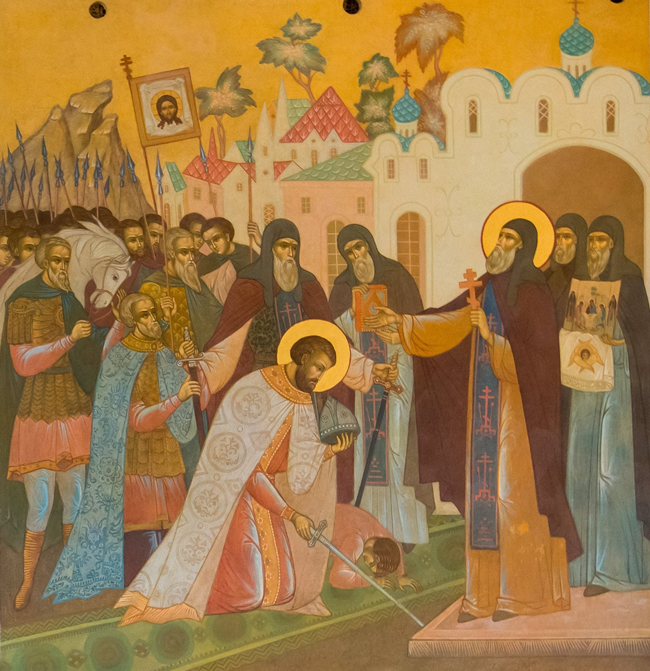
[1] When Jesus knew in himself that his disciples murmured at it, he said unto them, Doth this offend you? What and if ye shall see the Son of man ascend up where he was before? It is the spirit that quickeneth; the flesh profiteth nothing: the words that I speak unto you, they are spirit, and they are life. But there are some of you that believe not. For Jesus knew from the beginning who they were that believed not, and who should betray him. And he said, Therefore said I unto you, that no man can come unto me, except it were given unto him of my Father. From that time many of his disciples went back, and walked no more with him. John 6 61–66
[2] Wherefore I also, after I heard of your faith in the Lord Jesus, and love unto all the saints, Cease not to give thanks for you, making mention of you in my prayers; That the God of our Lord Jesus Christ, the Father of glory, may give unto you the spirit of wisdom and revelation in the knowledge of him: The eyes of your understanding being enlightened; that ye may know what is the hope of his calling, and what the riches of the glory of his inheritance in the saints, And what is the exceeding greatness of his power to us-ward who believe, according to the working of his mighty power, Which he wrought in Christ, when he raised him from the dead, and set him at his own right hand in the heavenly places, Far above all principality, and power, and might, and dominion, and every name that is named, not only in this world, but also in that which is to come: And hath put all things under his feet, and gave him to be the head over all things to the church, Which is his body, the fulness of him that filleth all in all. Ephesians 1 15–23
[3] And he is the head of the body, the church: who is the beginning, the firstborn from the dead; that in all things he might have the preeminence. For it pleased the Father that in him should all fulness dwell; And, having made peace through the blood of his cross, by him to reconcile all things unto himself; by him, I say, whether they be things in earth, or things in heaven. Colossians 1 18–20
[4] Then said he to the multitude that came forth to be baptized of him, O generation of vipers, who hath warned you to flee from the wrath to come? Bring forth therefore fruits worthy of repentance, and begin not to say within yourselves, We have Abraham to our father: for I say unto you, That God is able of these stones to raise up children unto Abraham. And now also the axe is laid unto the root of the trees: every tree therefore which bringeth not forth good fruit is hewn down, and cast into the fire. And the people asked him, saying, What shall we do then? He answereth and saith unto them, He that hath two coats, let him impart to him that hath none; and he that hath meat, let him do likewise. Luke 3 7–11
[5] These things write I unto thee, hoping to come unto thee shortly: But if I tarry long, that thou mayest know how thou oughtest to behave thyself in the house of God, which is the church of the living God, the pillar and ground of the truth. And without controversy great is the mystery of godliness: God was manifest in the flesh, justified in the Spirit, seen of angels, preached unto the Gentiles, believed on in the world, received up into glory. 1 Timothy 3 14–16
[6] But ye have not so learned Christ; If so be that ye have heard him, and have been taught by him, as the truth is in Jesus: That ye put off concerning the former conversation the old man, which is corrupt according to the deceitful lusts; And be renewed in the spirit of your mind; And that ye put on the new man, which after God is created in righteousness and true holiness. Wherefore putting away lying, speak every man truth with his neighbour: for we are members one of another. Be ye angry, and sin not: let not the sun go down upon your wrath: Neither give place to the devil. Ephesians 4 20–27
[7] But now ye also put off all these; anger, wrath, malice, blasphemy, filthy communication out of your mouth. Lie not one to another, seeing that ye have put off the old man with his deeds; And have put on the new man, which is renewed in knowledge after the image of him that created him: Where there is neither Greek nor Jew, circumcision nor uncircumcision, Barbarian, Scythian, bond nor free: but Christ is all, and in all. Colossians 3 8–11
[8] Jesus said unto them, If God were your Father, ye would love me: for I proceeded forth and came from God; neither came I of myself, but he sent me. Why do ye not understand my speech? even because ye cannot hear my word. Ye are of your father the devil, and the lusts of your father ye will do. He was a murderer from the beginning, and abode not in the truth, because there is no truth in him. When he speaketh a lie, he speaketh of his own: for he is a liar, and the father of it. And because I tell you the truth, ye believe me not. Which of you convinceth me of sin? And if I say the truth, why do ye not believe me? He that is of God heareth God’s words: ye therefore hear them not, because ye are not of God. John 8 42–47
[9] And there came one of the seven angels which had the seven vials, and talked with me, saying unto me, Come hither; I will shew unto thee the judgment of the great whore that sitteth upon many waters: With whom the kings of the earth have committed fornication, and the inhabitants of the earth have been made drunk with the wine of her fornication. So he carried me away in the spirit into the wilderness: and I saw a woman sit upon a scarlet coloured beast, full of names of blasphemy, having seven heads and ten horns. And the woman was arrayed in purple and scarlet colour, and decked with gold and precious stones and pearls, having a golden cup in her hand full of abominations and filthiness of her fornication: And upon her forehead was a name written, MYSTERY, BABYLON THE GREAT, THE MOTHER OF HARLOTS AND ABOMINATIONS OF THE EARTH. And I saw the woman drunken with the blood of the saints, and with the blood of the martyrs of Jesus: and when I saw her, I wondered with great admiration. Revelation 17 1–6
[10] Come unto me, all ye that labour and are heavy laden, and I will give you rest. Take my yoke upon you, and learn of me; for I am meek and lowly in heart: and ye shall find rest unto your souls. For my yoke is easy, and my burden is light. Matthew 11 28–30
[11] And Jesus rebuked the devil; and he departed out of him: and the child was cured from that very hour. Then came the disciples to Jesus apart, and said, Why could not we cast him out? And Jesus said unto them, Because of your unbelief: for verily I say unto you, If ye have faith as a grain of mustard seed, ye shall say unto this mountain, Remove hence to yonder place; and it shall remove; and nothing shall be impossible unto you. Howbeit this kind goeth not out but by prayer and fasting. Matthew 17 18–21
[12] But when he had turned about and looked on his disciples, he rebuked Peter, saying, Get thee behind me, Satan: for thou savourest not the things that be of God, but the things that be of men. And when he had called the people unto him with his disciples also, he said unto them, Whosoever will come after me, let him deny himself, and take up his cross, and follow me. For whosoever will save his life shall lose it; but whosoever shall lose his life for my sake and the gospel’s, the same shall save it. For what shall it profit a man, if he shall gain the whole world, and lose his own soul? Or what shall a man give in exchange for his soul? Whosoever therefore shall be ashamed of me and of my words in this adulterous and sinful generation; of him also shall the Son of man be ashamed, when he cometh in the glory of his Father with the holy angels. Mark 8 33–38
[13] For so is the will of God, that with well doing ye may put to silence the ignorance of foolish men: As free, and not using your liberty for a cloke of maliciousness, but as the servants of God. Honour all men. Love the brotherhood. Fear God. Honour the king. Servants, be subject to your masters with all fear; not only to the good and gentle, but also to the froward. For this is thankworthy, if a man for conscience toward God endure grief, suffering wrongfully. For what glory is it, if, when ye be buffeted for your faults, ye shall take it patiently? but if, when ye do well, and suffer for it, ye take it patiently, this is acceptable with God. For even hereunto were ye called: because Christ also suffered for us, leaving us an example, that ye should follow his steps: Who did no sin, neither was guile found in his mouth: Who, when he was reviled, reviled not again; when he suffered, he threatened not; but committed himself to him that judgeth righteously: Who his own self bare our sins in his own body on the tree, that we, being dead to sins, should live unto righteousness: by whose stripes ye were healed. For ye were as sheep going astray; but are now returned unto the Shepherd and Bishop of your souls. 1 Peter 2 15–25
[14] This I say then, Walk in the Spirit, and ye shall not fulfil the lust of the flesh. For the flesh lusteth against the Spirit, and the Spirit against the flesh: and these are contrary the one to the other: so that ye cannot do the things that ye would. But if ye be led of the Spirit, ye are not under the law. Now the works of the flesh are manifest, which are these; Adultery, fornication, uncleanness, lasciviousness, Idolatry, witchcraft, hatred, variance, emulations, wrath, strife, seditions, heresies, Envyings, murders, drunkenness, revellings, and such like: of the which I tell you before, as I have also told you in time past, that they which do such things shall not inherit the kingdom of God. But the fruit of the Spirit is love, joy, peace, longsuffering, gentleness, goodness, faith, Meekness, temperance: against such there is no law. And they that are Christ’s have crucified the flesh with the affections and lusts. If we live in the Spirit, let us also walk in the Spirit. Let us not be desirous of vain glory, provoking one another, envying one another. Galatians 5 16–26
[15] Therefore all things whatsoever ye would that men should do to you, do ye even so to them: for this is the law and the prophets. Enter ye in at the strait gate: for wide is the gate, and broad is the way, that leadeth to destruction, and many there be which go in thereat: Because strait is the gate, and narrow is the way, which leadeth unto life, and few there be that find it. Matthew 7 12–14

Orthodox Life, Vol. 26, No. 3, May-June 1976, pp. 1-5
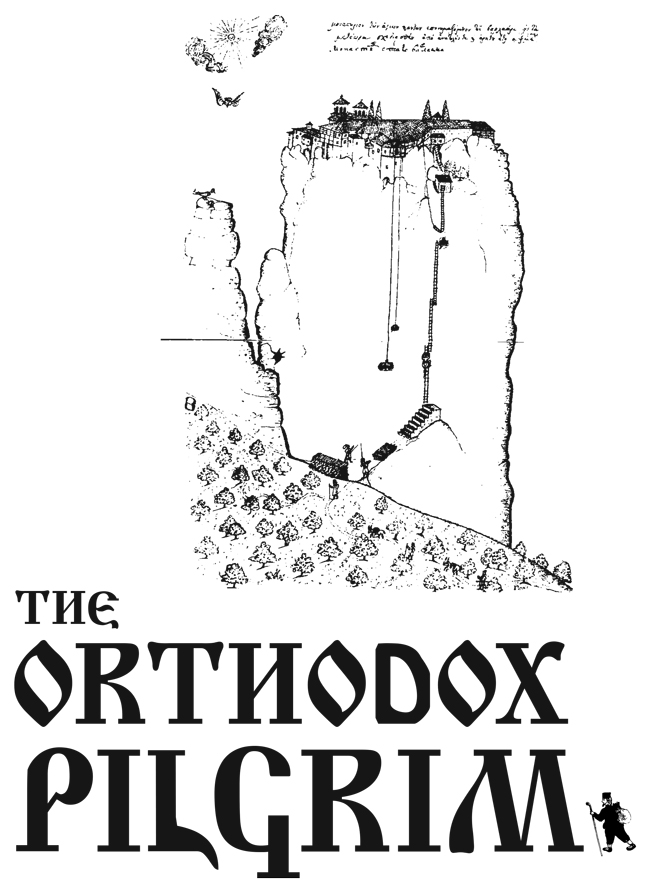
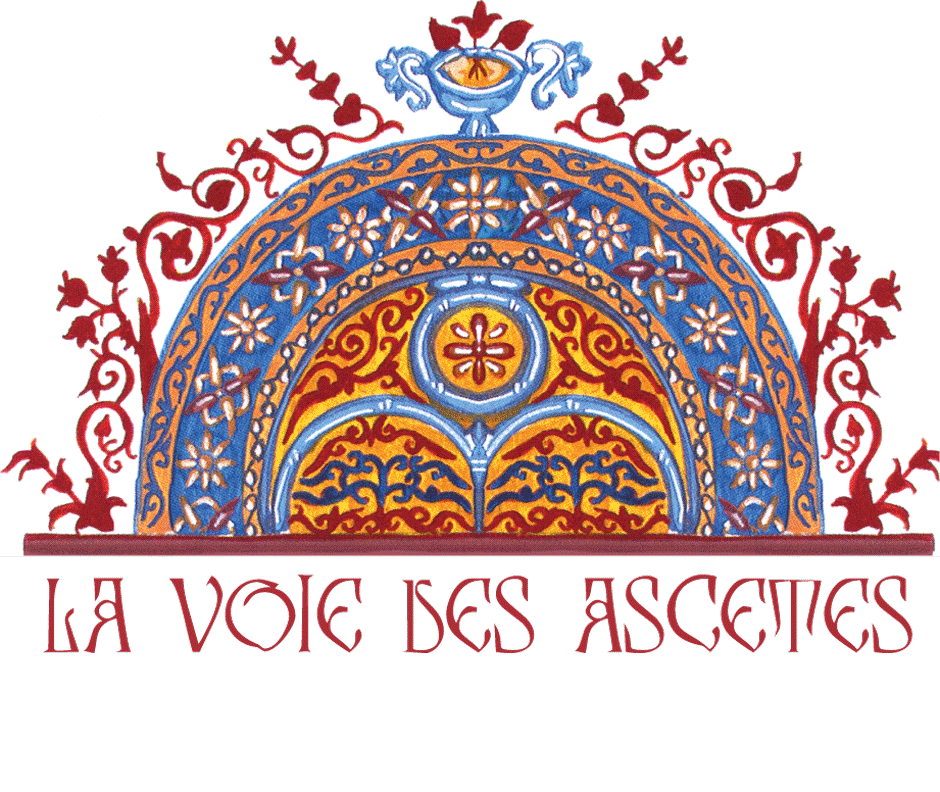
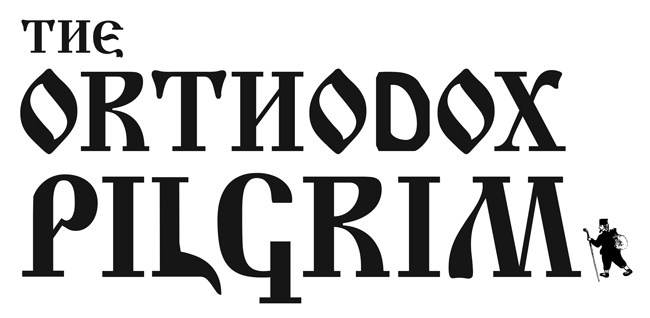
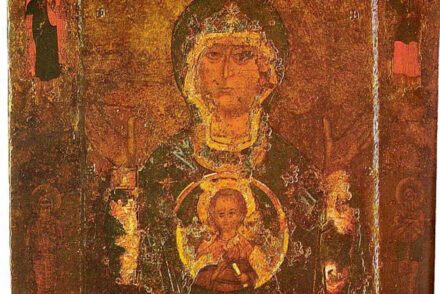

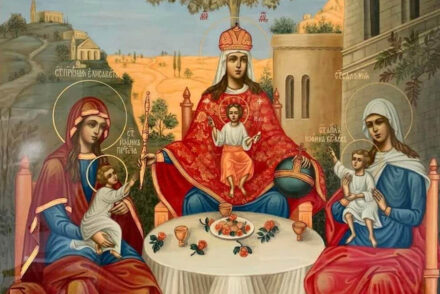
Pas de commentaire